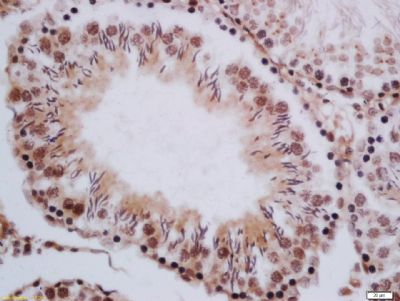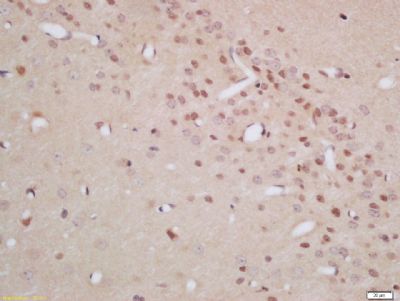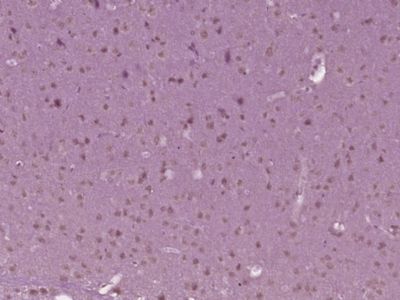CRBN Polyclonal Antibody
Purified Rabbit Polyclonal Antibody (Pab)
- SPECIFICATION
- CITATIONS
- PROTOCOLS
- BACKGROUND

Application
| IHC-P, IHC-F, IF, E |
|---|---|
| Primary Accession | Q96SW2 |
| Reactivity | Rat, Pig, Dog, Bovine |
| Host | Rabbit |
| Clonality | Polyclonal |
| Calculated MW | 51 KDa |
| Physical State | Liquid |
| Immunogen | KLH conjugated synthetic peptide derived from human CRBN |
| Epitope Specificity | 210-288/442 |
| Isotype | IgG |
| Purity | affinity purified by Protein A |
| Buffer | 0.01M TBS (pH7.4) with 1% BSA, 0.02% Proclin300 and 50% Glycerol. |
| SUBCELLULAR LOCATION | Cytoplasm. Nucleus. Membrane; Peripheral membrane protein |
| SIMILARITY | Belongs to the CRBN family. |
| SUBUNIT | Interacts with KCNT1 (By similarity). Component of a DCX (DDB1-CUL4-X-box) protein ligase complex, at least composed of CRBN, CUL4A, DDB1 and RBX1. |
| Post-translational modifications | Ubiquitinated, ubiquitination is mediated by its own DCX protein ligase complex. |
| DISEASE | Defects in CRBN are the cause of mental retardation autosomal recessive type 2A (MRT2A) [MIM:607417]. MRT2A patients display mild mental retardation with a standard IQ ranged from 50 to 70. IQ scores are lower in males than females. Developmental milestones are mildly delayed. There are no dysmorphic or autistic features. Non-syndromic mental retardation patients do not manifest other clinical signs. |
| Important Note | This product as supplied is intended for research use only, not for use in human, therapeutic or diagnostic applications. |
| Background Descriptions | CRBN is a 442 amino acid protein which is highly concentrated in human brain tissue. CRBN functions are thought to be related to energy metabolism, learning and memory. Localized to the cytoplasm, CRBN acts as a protease in mitochondria and is thought to regulate the assembly of KCNT1, as well as the surface expression of KCNT1 in brain regions known to affect memory and learning, such as the hippocampus. The gene encoding CRBN belongs to a family of ATP-dependent lon proteases that play a role in membrane trafficking and proteolysis. Defects in the CRBN gene are associated with mild mental retardation. |
| Gene ID | 51185 |
|---|---|
| Other Names | Protein cereblon, CRBN |
| Target/Specificity | Widely expressed. Highly expressed in brain. |
| Dilution | IHC-P=1:100-500,IHC-F=1:100-500,IF=1:100-500,ELISA=1:5000-10000 |
| Storage | Store at -20 ℃ for one year. Avoid repeated freeze/thaw cycles. When reconstituted in sterile pH 7.4 0.01M PBS or diluent of antibody the antibody is stable for at least two weeks at 2-4 ℃. |
| Name | CRBN |
|---|---|
| Function | Substrate recognition component of a DCX (DDB1-CUL4-X-box) E3 protein ligase complex that mediates the ubiquitination and subsequent proteasomal degradation of target proteins, such as MEIS2, ILF2 or GLUL (PubMed:26990986, PubMed:33009960). Normal degradation of key regulatory proteins is required for normal limb outgrowth and expression of the fibroblast growth factor FGF8 (PubMed:20223979, PubMed:24328678, PubMed:25043012, PubMed:25108355). Maintains presynaptic glutamate release and consequently cognitive functions, such as memory and learning, by negatively regulating large-conductance calcium-activated potassium (BK) channels in excitatory neurons (PubMed:18414909, PubMed:29530986). Likely to function by regulating the assembly and neuronal surface expression of BK channels via its interaction with KCNT1 (PubMed:18414909). May also be involved in regulating anxiety-like behaviors via a BK channel-independent mechanism (By similarity). Plays a negative role in TLR4 signaling by interacting with TRAF6 and ECSIT, leading to inhibition of ECSIT ubiquitination, an important step of the signaling (PubMed:31620128). |
| Cellular Location | Cytoplasm. Nucleus. Membrane; Peripheral membrane protein |
| Tissue Location | Widely expressed. Highly expressed in brain. |

Thousands of laboratories across the world have published research that depended on the performance of antibodies from Abcepta to advance their research. Check out links to articles that cite our products in major peer-reviewed journals, organized by research category.
info@abcepta.com, and receive a free "I Love Antibodies" mug.
Provided below are standard protocols that you may find useful for product applications.
If you have used an Abcepta product and would like to share how it has performed, please click on the "Submit Review" button and provide the requested information. Our staff will examine and post your review and contact you if needed.
If you have any additional inquiries please email technical services at tech@abcepta.com.













 Foundational characteristics of cancer include proliferation, angiogenesis, migration, evasion of apoptosis, and cellular immortality. Find key markers for these cellular processes and antibodies to detect them.
Foundational characteristics of cancer include proliferation, angiogenesis, migration, evasion of apoptosis, and cellular immortality. Find key markers for these cellular processes and antibodies to detect them. The SUMOplot™ Analysis Program predicts and scores sumoylation sites in your protein. SUMOylation is a post-translational modification involved in various cellular processes, such as nuclear-cytosolic transport, transcriptional regulation, apoptosis, protein stability, response to stress, and progression through the cell cycle.
The SUMOplot™ Analysis Program predicts and scores sumoylation sites in your protein. SUMOylation is a post-translational modification involved in various cellular processes, such as nuclear-cytosolic transport, transcriptional regulation, apoptosis, protein stability, response to stress, and progression through the cell cycle. The Autophagy Receptor Motif Plotter predicts and scores autophagy receptor binding sites in your protein. Identifying proteins connected to this pathway is critical to understanding the role of autophagy in physiological as well as pathological processes such as development, differentiation, neurodegenerative diseases, stress, infection, and cancer.
The Autophagy Receptor Motif Plotter predicts and scores autophagy receptor binding sites in your protein. Identifying proteins connected to this pathway is critical to understanding the role of autophagy in physiological as well as pathological processes such as development, differentiation, neurodegenerative diseases, stress, infection, and cancer.




